Despite the fact that Marvel’s Civil War II was a mess that killed War Machine, made Captain Marvel an arsehole, and set Steve Rogers on the path toward becoming a fascist, no one in the Marvel universe really seems to be thinking about Civil War II‘s event any more.
Marvel
But, in writer Mariko Tamaki and artist Nico Leon’s Hulk (which is set just before Secret Empire), Jennifer Walters is struggling to recover from the aftermath of having a near death experience and learning that her cousin Bruce was murdered by Hawkeye during Civil War II.
While most of Marvel’s universe is currently busy dealing with Hydra taking over the world, Hulk is telling a much different story about psychological trauma and how it can stick with people long after their physical wounds have healed.

In the world of comic books, when superheroes fall down, they get back up to fight again. When they lose, they come up with a new plan to help them win. Oftentimes, when they die, they come back from the grave to keep fighting the good fight.
It’s that unending perseverance that makes heroes’ adventures so interesting, but oftentimes, stories don’t consider what kinds of consequences a superhero might be forced to deal with as a result of their undying heroism. For the past six issues, Hulk has been following Jessica Walters as she recovers from her encounter with Thanos that left her in a coma.
At the opening of her story arc, Jen’s body has seemingly recovered from its injuries and she’s finally getting back to work at her law firm. Everything’s going to be normal, Jen tells herself. Everything’s fine. Except that everything isn’t fine. On some level, Jen knows this, but she won’t let herself believe it, and the burden of this knowing denial begins to manifest itself as anxiety and self-doubt.
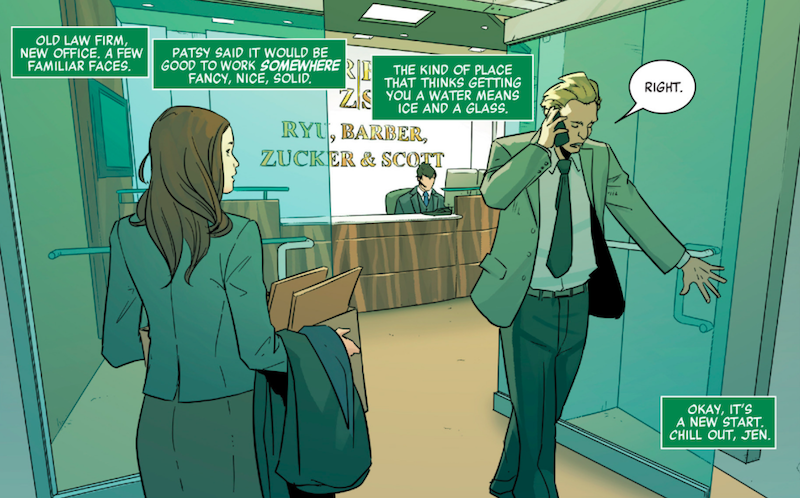
One of the main things that set She-Hulk apart from her male counterpart in the past was the fact that, despite possessing a Hulk’s strength, she was able to maintain control of her mental faculties. For Jen, her human identity and her Hulk identity were one and the same, existing in a careful, but strong balance that made her strong, confident and bold.
In Hulk, though, it’s revealed that the panic attacks that Jen’s experiencing aren’t just regular bouts of heightened anxiety, they’re moments of intense Hulk-powered fear and aggression triggered by something around her. Where Jen could control her Hulk transformations with relative ease before, the shift now threatens to overtake her body and mind, turning her into the sort of dangerous behemoth that made the Bruce Banner Hulk so deadly.
When the attacks come, Jen fights them as best as she can on her own. Not all that unsurprisingly, Jen’s realised watching cooking videos and deep breathing are some of the only things that calm her down from going full berserker.
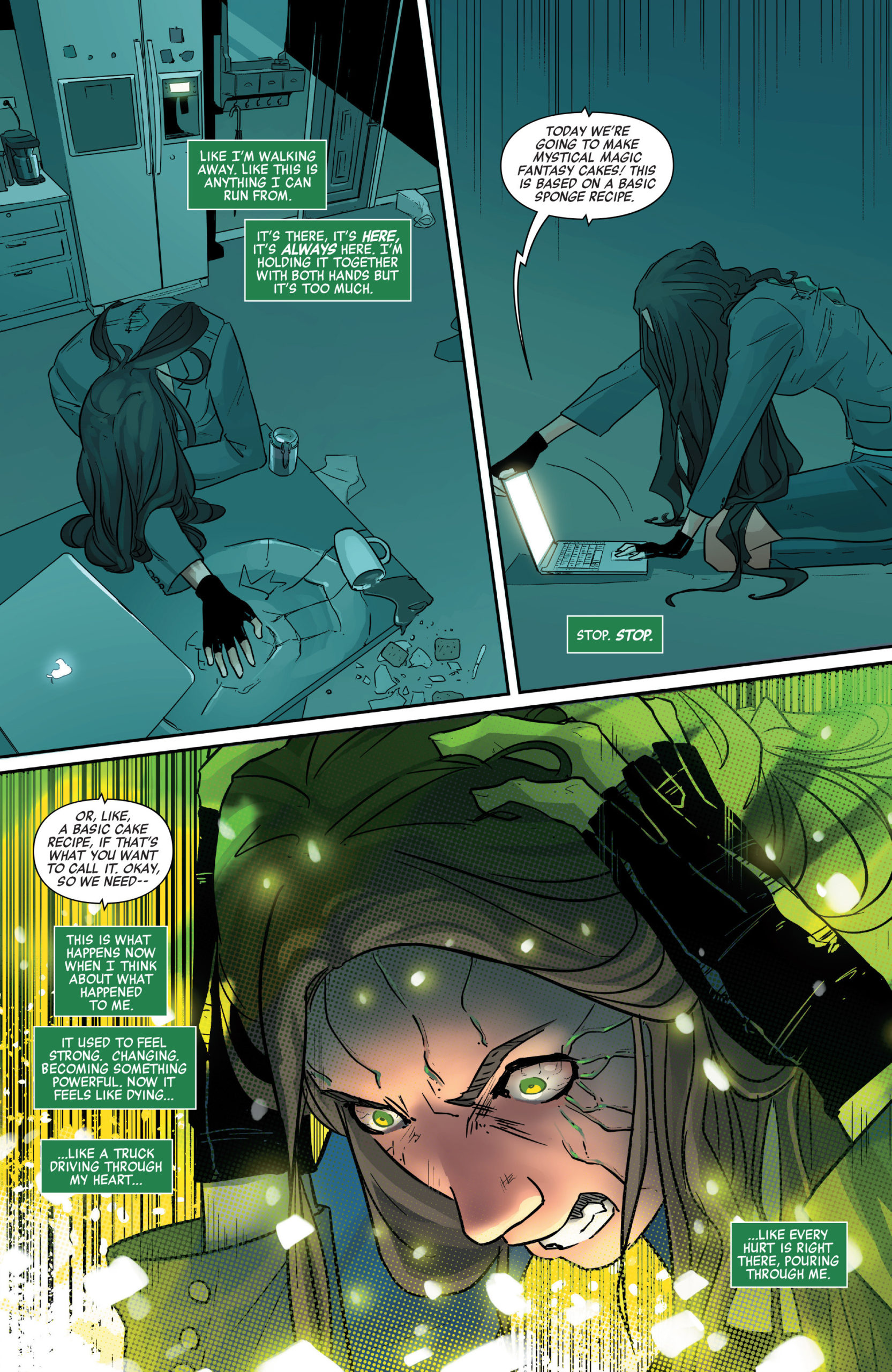
In a very real way, Jen’s dealing with a recognisable form of post-traumatic stress disorder, brought on by all sorts of devastating experiences she’s still reeling from but not directly dealing with. While attempting to get back to her normal life is an understandable and healthy reaction to a point, Jen’s refusal to confront her demons head-on contributes to her being re-traumatised over and over again.
Comics have dealt with anxiety and a number of mental illnesses in the past, but what sets Hulk apart is its decision to have Jen run away from her anxiety while being fully conscious of its existence. Much in the same way that real untreated anxiety disorders can have a serious impact on a person’s life, Jen’s repression and denial of her trauma constantly drives her to the precipice of full-on Hulking out. As the series goes on, Jen’s fear of going Hulk only serves to compound her anxieties, making each panic attack more devastating than the last.
While Jen’s going through all of this, Hulk‘s first story arc sees her acting as legal counsel for Maise Brewn, an Inhuman shut-in being threatened with eviction. Though Jen promises Maise that she’ll protect her from whatever threats her landlord is levelling, Maise’ odd behaviour and inappropriate oversharing make it difficult for Jen to follow through.
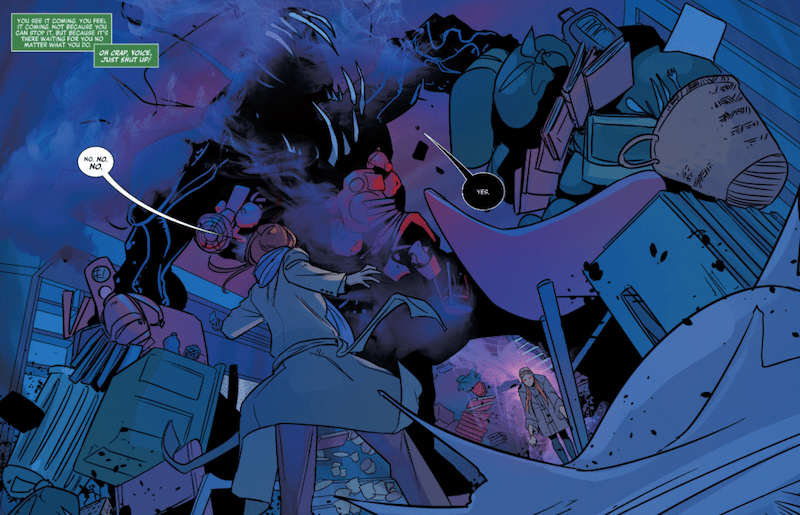
When Jen explains to Maise that she won’t be able to save her apartment, Maise lashes out with her Inhuman ability to manifest a golem made of fear and attacks Jen, squarely putting her in the sort of situation she’s avoided post-Civil War.
In most comics, this would be the moment of revelation for Jen — the moment of truth where she gives in to the urge to go Hulk that’s been gnawing at the edge of her consciousness, defeats the bad guy, and realises that she just needs to let it all out. But Hulk understands that trauma doesn’t heal itself so neatly.
Yes, Jen does Hulk out and defeat the fear golem, but still — something’s not right. For one, she transforms into a grey Hulk, rather than her usual green. She’s strong and agile, but her mind is simplified, feral, and almost all pure id. She’s thinking at a higher level than Bruce normally did as the Hulk, but she’s nowhere near who she used to be, and she doesn’t know if she ever can be again.
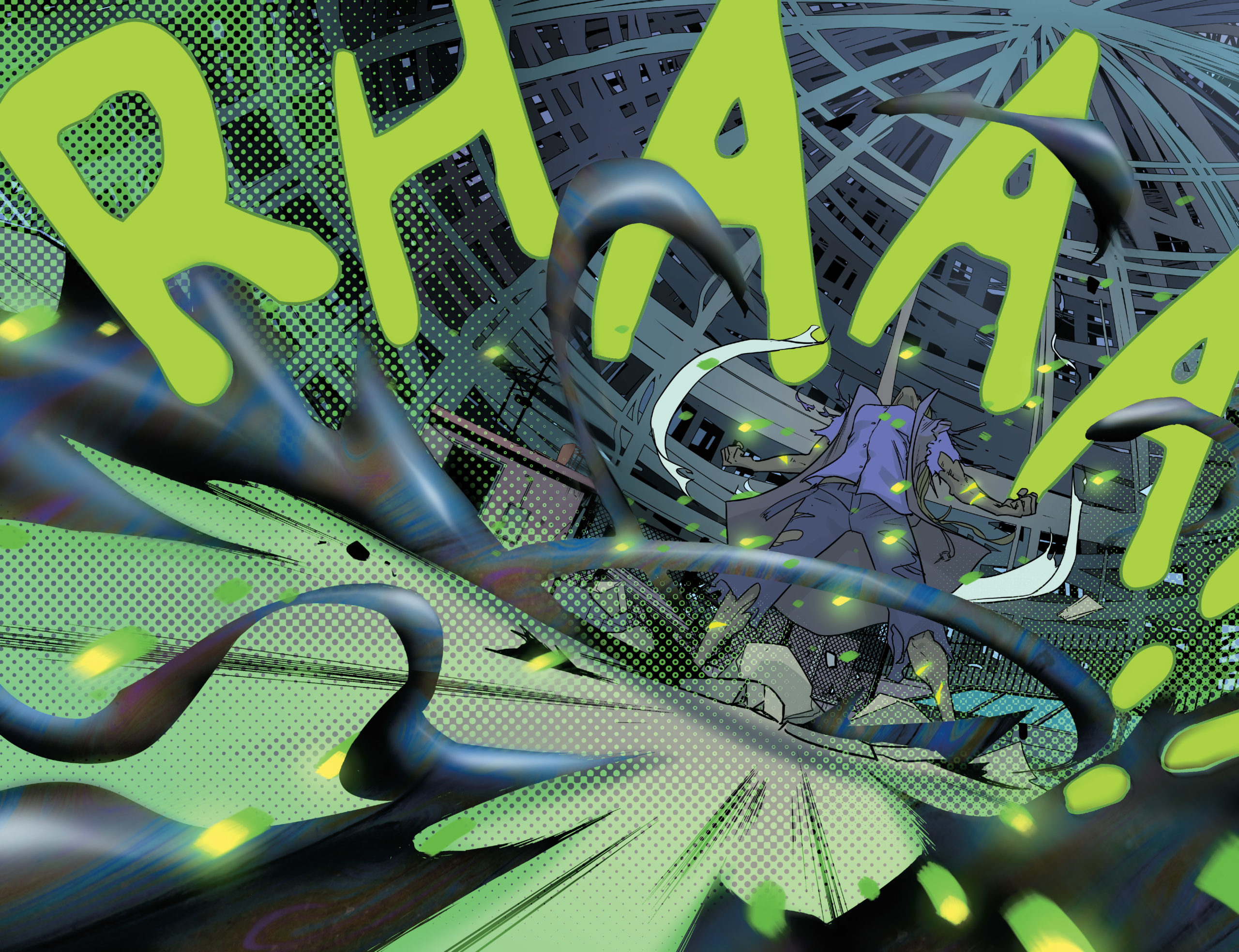
Jen gives into the pain and fear that she’s been grappling with and discovers that acknowledging that she needs help is only the first of many steps she has to make before she’s whole again. In a very literal sense, Hulk is the perfect name for this series because She-Hulk, for the time being, doesn’t exist any more. Jen Walters is presumably on her way to recovering her vibrant, fully realised self and coming to grips with the horrors that have befallen her. But until then, she’s very much a Hulk in progress.
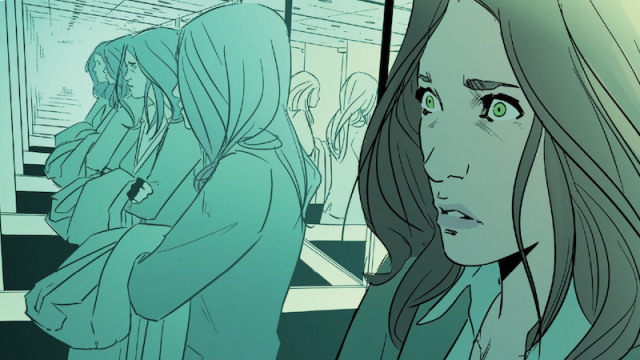
Comments
7 responses to “Marvel’s Hulk Is Telling A Painful Story About The Psychological Trauma Of Being A Superhero”
I understand the mentality behind this change to Jen and the way she is, but it just reads like the old Bruce Banner story where he fears turning Hulk due to lacking control. Personally I enjoyed the Jen Walters side of the character, balancing being a superhero with being a lawyer and having to work both sides of the law. But Marvel does what they want to do and then complain about how readers are at fault when the story drives them away
We’ve got decades of Jen doing that and it is very likely that she’ll go back to it eventually. I don’t see the problem with allowing a character-growth arc where she’s taken to a different place.
I’m not really sure it’s character growth for Jen. It feels like they took all the classic “trying to keep The Hulk under control from coming out” that’s been Bruce’s MO for decades and put it into Jen because Bruce isn’t around at the moment.
I know we’ve had decades of Jen being the more stable and in control of the Hulks, but that’s what made her unique and interesting. This new version just seems like Bruce gender-swapped and turned up to 11 till they can bring Bruce back.
Yes, that made her unique and interesting, but being unique and interesting in the /one same way/ for decades can also get rote. I know this seems like a plight similar to Banner’s but it is fundamentally different precisely because she was composed and in control previously. For her “hulking out” is, in addition to everything that it was for Banner, a new and terrifying experience, a challenge to something that she took for granted.
I’ve actually enjoyed this reboot of she-hulk/hulk. She-hulk used to be break the 4th wall but this one is more on the serious side, and actually have enjoyed it more then older ones.
I like this change. Too bad they had to kill Bruce, who finally was at peace with the Hulk, and ruin Hawkeye with a completely out of character assassination.
Remember that Banner himself asked it out of him (and gave him the means to do so). It IS out of character but not unbelievable or unreasonable. People sometimes are forced to go against their own nature for a good enough reason and that time Hawkeye thought he was both saving the world and fulfilling Banner’s wishes, so he put his own instincts away.